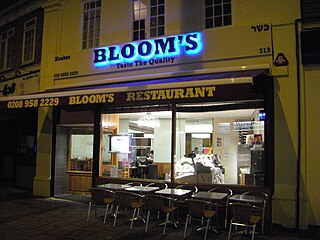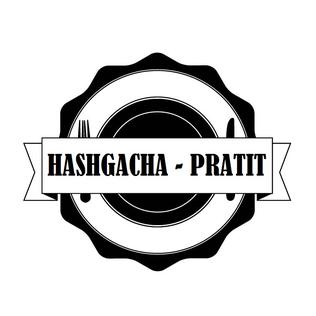Kashrut is a set of dietary laws dealing with the foods that Jewish people are permitted to eat and how those foods must be prepared according to Jewish law. Food that may be consumed is deemed kosher, from the Ashkenazi pronunciation of the term that in Sephardic or Modern Hebrew is pronounced kashér, meaning "fit".

An Internet café, also known as a cybercafé, is a café that provides the use of computers with high bandwidth Internet access on the payment of a fee. Usage is generally charged by the minute or part of hour. An Internet cafe will generally also offer refreshments or other services such as phone repair. Internet cafes are often hosted within a shop or other establishment. They are located worldwide, and many people use them when traveling to access webmail and instant messaging services to keep in touch with family and friends. Apart from travelers, in many developing countries Internet cafés are the primary form of Internet access for citizens as a shared-access model is more affordable than personal ownership of equipment and/or software. Internet cafés are a natural evolution of the traditional café. As Internet access rose many pubs, bars and cafés added terminals and eventually Wi-Fi hotspots, eroding the distinction between the Internet café and normal cafés.

A mashgiach or mashgicha is a Jew who supervises the kashrut status of a kosher establishment. Mashgichim may supervise any type of food service establishment, including slaughterhouses, food manufacturers, hotels, caterers, nursing homes, restaurants, butchers, groceries, or cooperatives. Mashgichim usually work as on-site supervisors and inspectors, representing a kosher certification agency or a local rabbi, who actually makes the policy decisions for what is or is not acceptably kosher. Sometimes certifying rabbis act as their own mashgichim; such is the case in many small communities.

OK Kosher Certification is a major kosher certification agency based out of Brooklyn, NY. It is one of the "Big Five," the five largest kosher certifying agencies in the United States. OK also has a large kosher presence in Asia.

Masbia is a network of kosher soup kitchens in New York City. Its three locations in the Brooklyn neighborhoods of Borough Park and Midwood, as well as the Queens neighborhood of Rego Park, serve over 500 free, hot kosher meals nightly. Masbia is the only free soup kitchen serving kosher meals in New York City. The organization receives 10% of its budget from government aid, relying heavily on private donations of money and food to meet its $2 million annual operating budget.

Star-K Kosher Certification, also known as the Vaad Hakashrut of Baltimore, is a kosher certification agency based in Baltimore, Maryland, under the administration of Rabbi Moshe Heinemann, with the involvement of many other rabbis. It is one of the largest Jewish dietary certification agencies in North America. It is trusted by many Orthodox Jews worldwide for dedication to preserving Kashrut. The organization supervises tens of thousands of commercial food products and food establishments around the world.

A kosher restaurant or kosher deli is an establishment that serves food that complies with Jewish dietary laws (kashrut). These businesses, which also include diners, cafés, pizzerias, fast food, and cafeterias, and are frequently in listings together with kosher bakeries, butchers, caterers, and other similar places, differ from kosher-style businesses in that they operate under rabbinical supervision, which requires that the laws of kashrut, as well as certain other Jewish laws, including the separation of meat and dairy must be observed.
The Tav HaYosher is a certification mark offered, free of charge, to Kosher food establishments that meet a series of ethical criteria developed by the organization, Uri L'Tzedek. Particularly, the Tav HaYosher confirms that an eating establishment with its seal pays minimum wage to all employees and overtime to those employees working more than 40 hours a week. It also ensures the establishment offers employees appropriate breaks as required by law, and provides a safe and abuse-free working environment.
Sasabune is a Japanese sushi restaurant located at 401 East 73rd Street on the Upper East Side of Manhattan, in New York City.
@Cafe, one of New York City's first dedicated internet cafes, was incorporated in early 1995 by Glenn McGinnis, Nicolas Barnes and Chris Townsend and opened its doors on Tuesday, April 25, 1995 with the slogan “Eat, Drink, ‘Net.” Founded at 12 St. Marks Place on the site of the original location of St. Mark's Bookshop, the 2,500 sq foot cafe positioned itself as a place where the formerly solitary pursuits of computing were combined with a social atmosphere of a full bar and restaurant. In addition to the food and drink, the cafe offered dial-up internet services and email accounts through their fly.net web portal. Computer and internet usage was billed at $5 per half-hour. The business idea was inspired by Japanese video game cafes that McGinnis had frequented when he lived in Japan during the 1980s. During the internet's early days when the medium was still mostly unexplored, @Cafe tried to present “the internet at its best,” paying $9,000 a month for a dedicated T1 line and supplying powerful PC or Mac computers at every table.

American Jewish cuisine comprises the food, cooking, and dining customs associated with American Jews. It was heavily influenced by the cuisine of Jewish immigrants who came to the United States from Eastern Europe around the turn of the 20th century. It was further developed in unique ways by the immigrants and their descendants, especially in New York City and other large metropolitan areas of the northeastern U.S.

The Eucalyptus is a Jerusalem fine dining restaurant. It is noted for its use of biblical ingredients and the use of wild plants and roots foraged from the nearby hillsides, and for preparing traditional and innovative Levantine, Arab, and Jewish cuisine.

Hashgacha Pratit (השגחה-פרטית) is an independent, Israel-based organization with both female and male clergy that self-describes as providing an alternative form of Orthodox Rabbinical authority and social activism group dedicated to challenging the monopoly of the Chief Rabbinate of Israel over religious ceremonies and practices, through the provision of private religious ceremonies. Founded in 2012 by Rabbi Aaron Leibowitz in Jerusalem, Israel, it offers alternative halachic services in life-cycle events, rabbinical training, and other courses in religious education. It has provided private kashrut supervision for restaurants, worked on raising public awareness and finding loopholes in the laws to circumvent the Chief Rabbinate's monopoly, first regarding Kashrut, by leading the movement to open the kosher food market to competition, and today regarding Orthodox wedding ceremonies.

Jeff's Gourmet Sausage Factory is a glatt kosher sausage factory and restaurant in Los Angeles, California. Established in 1999 in a small storefront in the Pico-Robertson district, it serves a variety of Eastern European Jewish– and Mediterranean-style sausages, hamburgers, and deli sandwiches and wraps. All of its meats are prepared in-house.

Basil Pizza & Wine Bar is a restaurant in the Crown Heights neighborhood of Brooklyn, New York.
Ethiopian Jewish cuisine is the cuisine of the Beta Israel. The cuisine of the Ethiopian Jews is similar to the cuisine of other Ethiopians, with some variations.
Black Jews in New York City comprise one of the largest communities of Black Jews in the United States. Black Jews have lived in New York City since colonial times, with organized Black-Jewish and Black Hebrew Israelite communities emerging during the early 20th century. Black Jewish and Black Hebrew Israelite communities have historically been centered in Harlem, Brooklyn, The Bronx, and Queens. The Commandment Keepers movement originated in Harlem, while the Black Orthodox Jewish community is centered in Brooklyn. New York City is home to four historically Black synagogues with roots in the Black Hebrew Israelite community. A small Beta Israel (Ethiopian-Jewish) community also exists in New York City, many of whom emigrated from Israel. Black Hebrew Israelites are not considered Jewish by the New York Board of Rabbis, an organization representing mainstream Rabbinic Judaism.











